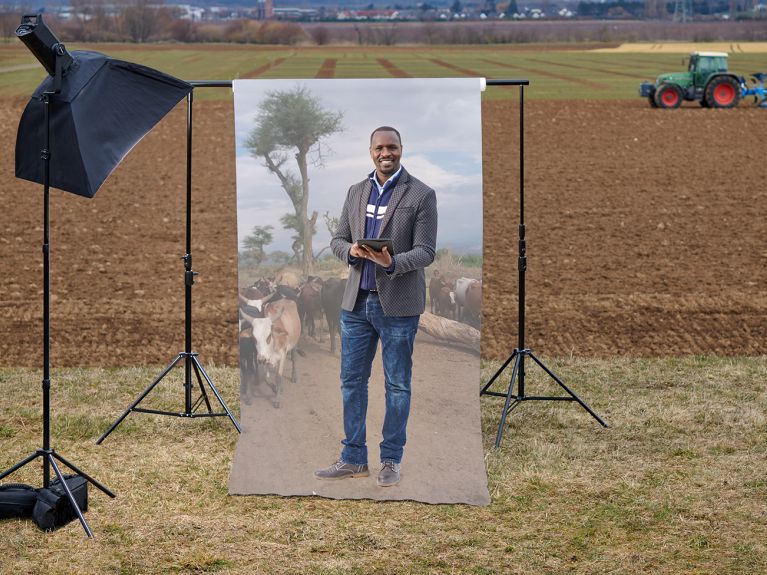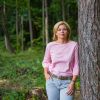Dr. Kirui’s project
How a Kenyan agricultural economist at Bonn University is helping people in Africa by their own means – and protecting the climate at the same time.

For his PhD thesis Oliver Kirui spent over five months travelling around Kenya, Malawi, Tanzania and Ethiopia. He spoke to farmers, mayors and village elders. He repeatedly asked the question: How has your land and its use changed in recent decades? The villagers drew maps and often said: Where our houses now are there used to be forest.
Oliver Kirui is 34 years old and an agricultural economist at the Centre for Development Research (ZEF) at Bonn University. Scientists from across the world congregate here. Kirui was born and grew up in Kenya’s highlands. His family grows tea and vegetables, keeps chicken and a few cows. “I grew up in a farming community,” Kirui explains. Most of the smallholders lived in precarious circumstances.
Kirui wanted to help the farmers and began by asking himself: How can we make farming profitable and at the same time sustainable? Meaning: So that we all have enough to eat, yet the land remains fertile. This notion has become the guiding principle to Kirui’s approach: “We haven’t inherited the earth from our parents – we have borrowed it from our great-great-grandchildren.”
Kirui studied Agricultural Science in Nairobi and in the South African city of Pretoria. In 2012 he met a professor from Bonn at a conference in Brazil who a few months later was to become his doctoral supervisor.
What can we do to get our beautiful nature back?
As part of his PhD project Kirui researched land degradation and its effects on the people. There is a strong connection between poor soils and poverty,” says Kirui. Of the 2,000-plus interviews he conducted, one encounter has lingered in his memory the most: At the time he sat among the inhabitants of a Tanzanian village. The harvests were declining more and more, they worried. One old woman said: “The good days are over. What can we do to get our beautiful nature back?”
These are moments when scientist Kirui feels helpless: Turn back the clock? Of course, he can’t. But Kirui is someone who sees a silver lining even in dark clouds. “The African farmers are a strong, resilient community” he says. Instead of passively waiting for external help, many developed their own ideas for combating the negative effects of soil erosion and climate change. After completing his PhD thesis in 2016 Kirui started a project that would highlight the ideas of African farmers.
Kirui started his project after completing his PhD
Radio spots called for farmers young and old to apply with their own inventions. Detailed questionnaires were handed out in six African countries. A total of 780 applications were received, about half of which are, Kirui says, “real innovations”. A Kenyan winner for example had designed a beehive that can be opened without disturbing the bees and destroying the comb.
The winner from Malawi somewhat accidentally found a remedy for the eye disease that spreads epidemically among sheep and goats during heat waves. Flies infect the eyes with a pathogen that turns the animals blind. She had applied a paste made from tomato leaves to the diseased eyes – and the animals were able to see again. A Malawi research institute was now trying to find out which active substance was responsible for the healing effect.
An attentive farmer from Zambia has even turned her discovery into a product ready for the market, relates Kirui. She had observed that wild boars remained fat and healthy in dry periods, while her own domestic pigs lost weight. She thus mixed a certain wild plant that the wild boars were eating into her animal’s feed: And sure enough, soon her pigs were bigger and healthier than her neighbours’ animals.

While other organisations are now holding similar contests in other African countries, Kirui is working on his next project: He wants to drum up enthusiasm among African youths for farming through an education system based on the German model. Technology and machines instead of pure brawn, with fields for example being surveilled by drones. “My goal is to make farming sexy,” says Kirui and laughs.
Digitisation is a further step towards the future. Another is a step back: “The plant of the future in Africa is millet,” says Kirui. Millet and sorghum have almost been forgotten, along with other native field crops. Yet they are much more drought-resistant, healthy and climate friendly than for example corn. In his home country doctor’s orders for those suffering high blood pressure or diabetes are to eat more millet, Kirui explains.
You would like to receive regular information about Germany?
Subscribe here:


